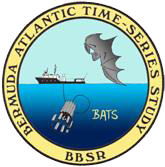 ©2020 Biological and Chemical Oceanography Data Management Office.
©2020 Biological and Chemical Oceanography Data Management Office.Funded by the U.S. National Science Foundation
A full description of the BATS research program (including links to the processed BATS data) is available from the BATS Web site (see above for Project URL/ Project Website links). Any data contributed from selected ancillary projects are listed (linked) in the 'Datasets Collection' section below.
Collaborative Research: The Bermuda Atlantic Time-series Study: Sustained Biogeochemical, Ecosystem and Ocean Change Observations and Linkages in the North Atlantic (Years 31-35)
Awards OCE-1756105, OCE-1756054, and OCE-1756312)
NSF award abstract
Long-term observations over several decades are a powerful tool for investigating ocean physics, biology, and chemistry, and the response of the oceans to environmental change. The Bermuda Atlantic Time-Series Study, known as BATS, has been running continuously since 1988. The research goals of the BATS program are: (1) to improve our understanding of the time-varying components of the ocean carbon cycle and the cycles of related nutrient elements such as nitrogen, phosphorus, and silicon; and, (2) to identify the relevant physical, chemical and ecosystem properties responsible for this variability. In addition, the BATS program has strong and diverse broader impacts, contributing to the field of ocean sciences by providing high quality ocean observations and data for seagoing scientists and modelers, and a framework through which researchers can conceive and test hypotheses. This award will support the operations of the BATS program for five more years.
The primary BATS research themes are as follows: (1) Quantify the role of ocean-atmosphere coupling and climate variability on air-sea exchange of CO2, and carbon export to the ocean interior; (2) Document trends and the controls on the interannual to decadal scale variability in carbon and nutrient cycles to their coupling in the surface and deep ocean via the Redfield Ratio paradigm; (3) Quantify the response of planktonic community structure and function, and impact on biogeochemical cycles to variability in surface fluxes and dynamical processes; (4) Facilitate development, calibration and validation of next generation oceanographic sensors, tools and technologies; and, (5) Generate a dataset that can be utilized by empiricists, modelers and students. This research integrates ocean physics, chemistry and biology into a framework for understanding oceanic processes and ocean change in the North Atlantic subtropical gyre. The existing 29 years of BATS data provide robust constraints on seasonal and interannual variability, the response of the Sargasso Sea ecosystem to natural climate variability, and signal detection of potential ocean changes. This project would extend the BATS program through years 31-35 to address a series of ten interlinked questions through integrated research approaches and a multitude of collaborative efforts. In addition to the themes above, and embedded into the ten questions and approaches, the BATS team will focus on, for example, coupling of particle production and biogeochemistry; revisiting the complexities of the biological carbon pump; oxygen decline; and changes in the hydrography, physics, ocean carbon cycle and biogeochemistry of the Sargasso Sea. The highest quality data observation and collection will be maintained and used to address these questions. Importantly, a wide range of collaborations at the BATS site, spanning the physical and biogeochemical disciplines, will aid these broad goals. Strong links to community stakeholders, and close collaboration (including methods intercomparisons and personnel exchanges) with the Hawaii Ocean Time-series are proposed. This work will extend the research findings of the project into educational and training opportunities within and beyond the oceanographic community, including training and mentorship of both undergraduate and graduate students.
Please see the BATS Web site (http://bats.bios.edu) for additional information.

Principal Investigator: Nicholas Bates
Bermuda Institute of Ocean Sciences (BIOS)
Co-Principal Investigator: Rodney J. Johnson
Bermuda Institute of Ocean Sciences (BIOS)
Co-Principal Investigator: Michael W. Lomas
Bermuda Institute of Ocean Sciences (BIOS)
Co-Principal Investigator: Deborah K. Steinberg
Virginia Institute of Marine Science (VIMS)
Contact: Michael W. Lomas
Bermuda Institute of Ocean Sciences (BIOS)
Ocean Carbon and Biogeochemistry [OCB]
U.S. Joint Global Ocean Flux Study [U.S. JGOFS]
Ocean Time-series Sites [Ocean Time-series]